Mon 26 Apr 2010
A Movie Review by David L. Vineyard: JUKE GIRL (1942).
Posted by Steve under Films: Drama/Romance , Reviews[2] Comments
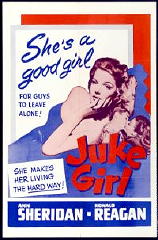
JUKE GIRL. Warner Brothers, 1942. Ann Sheridan, Ronald Reagan, Richard Whorf, George Tobias, Gene Lockhart, Alan Hale, Howard da Silva, Donald McBride, Faye Emerson, Fuzzy Knight, Willie Best. Screenplay by A.I. Bezzerides, based on a story by Theodore Pratt, adapted by Kenneth Gamet. Directed by Curtis Bernhardt.
History adds a touch of irony to this Warners social drama since in it Conservative icon and Republican President Ronald Reagan plays a radical left wing itinerant farm organizer, sort of an Anglo Cesar Chavez.
It’s the depths of the Depression and Reagan and pal Whorf have just wandered into the farming town of Cat Tail, California (“population 3,000 nine months a year, 30,000 the other three”) where shipper Gene Lockhart and his tough manager Howard da Silva are using their monopoly to break the farmers, like Greek George Tobias.
Whorf takes a job with Lockhart, but Reagan sticks up for Tobias and thus is set up a classic rivalry between buddies — pal against pal.
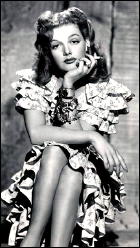
Enter Ann Sheridan, the dance hall girl of the title (a ‘Juke Girl’), a tough brassy broad who is no better than she has to be and not as bad as her face is painted — a typical Sheridan role, and a typical Warners leading lady — smart, self sufficient, tough, but with a heart of gold, and more morals than she lets on.
She and Reagan only need one look and the sparks fly (“You been burnin’ to get out of everywhere you ever been,” Reagan tells her). They teamed again more effectively in the classic King’s Row, but this one is closer to B territory, and they have more fun with it.
Reagan takes up with trucker Alan Hale, a two-fisted fellow also battling Lockhart and da Silva to help get Tobias and the other farmers in the cooperative’s crops to market — I told you this was an ironic role for Reagan — but Lockhart murders Tobias and frames Reagan and Sheridan for it.
As the lynch mob marches on the jail to take the lovers, Whorf and Hale coerce a confession from Lockhart, and save the lovers. Reagan and Sheridan end up with their own farm, Lockhart goes to jail, Hale is now in charge of helping the farmers, and Whorf hits the road again — but he’ll see them in nine months when the crops come in.
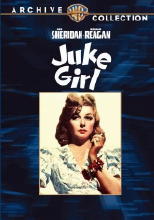
Reagan’s “Maybe I just don’t like to see a man kicked around,” is no Tom Joad’s speech from The Grapes of Wrath, but Sheridan has ‘oomph’ to spare, and if she is a thousand times better looking than the best looking dance hall girl who ever went to bed complaining about her aching feet, she had real skill at playing the kind of tough, human, and believable women Hollywood films too often turned into cliches.
Claire Trevor and Barbara Stanwyck were among the rare actresses who did it as well. Their working women had a way of making you think you might actually find them in a diner or dance hall — however unlikely that might be in real life.
Juke Girl lacks the righteous anger of Grapes of Wrath and the tragic eloquence, nor is it as emotionally tough as other Warners social drama classics such as I Was A Fugitive From a Chain Gang and Black Fury or the bright comedy/drama of films like Manpower, Slim or They Drive By Night. It’s also lacking a Paul Muni, Edward G. Robinson, James Cagney, or even George Raft, though Whorf does well in the Raft role in the film.
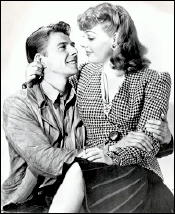
Reagan is a perfectly good lead, but he lacks the passion or the conviction this one calls for, the quiet dignity of a Henry Fonda, the caged power of a Cagney, or the depth and anguish of a Paul Muni — you keep half expecting him to mount a plough horse and ride off into a Republican sunset — exit stage right, of course. (In all fairness this was probably less a stretch before we knew his politics).
The film gets a good deal of good will though from fine contributions by Hale, Lockhart, da Silva, Tobias, Willie Best, and particularly from Sheridan’s famous ‘oomph.’ Whenever she is on screen, the film sparkles and threatens to become something more than what it is.
Juke Girl doesn’t have the head or the heart to be what it wanted to be, though it at least has the ambition to be something more. The seeds have been sewn, but all they bear are the grapes of mild indignation. It needed John Steinbeck and John Ford to turn social injustice into an American tragedy. Here we have a western with trucks and crops substituting for horses and cattle.
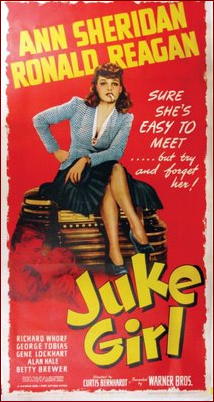
April 27th, 2010 at 6:16 am
I may never catch the movie, but the review kept my attention.
April 27th, 2010 at 9:41 am
Dan
It’s an entertaining film, but just falls a bit short of the usual Warner’s social drama in impact — even compared to other B fare like BLACK LEGION.
Similar to JUKE GIRL, but tougher minded and with some good action scenes is WILD HARVEST with Alan Ladd, Dorothy Lamour, Robert Preston, and Lloyd Nolan, the boys being traveling grain harvesters. But Dorothy is no Ann Sheridan and that Warner’s social conscience is missing for the most part.
John Waynes’ THREE FACES WEST is a bit closer to a roadshow GRAPES OF WRATH, though like JUKE GIRL subsequent politics made it a little hard to swallow John Wayne leading communal farmers west, though some Austrian refugees and Nazi menace tend to mediate the social drama aspect.